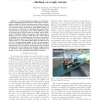Free Online Productivity Tools
i2Speak
i2Symbol
i2OCR
iTex2Img
iWeb2Print
iWeb2Shot
i2Type
iPdf2Split
iPdf2Merge
i2Bopomofo
i2Arabic
i2Style
i2Image
i2PDF
iLatex2Rtf
Sci2ools
145
click to vote
IROS
2007
IEEE
2007
IEEE
Behavior maps for online planning of obstacle negotiation and climbing on rough terrain
Abstract— To autonomously navigate on rough terrain is a challenging problem for mobile robots, requiring the ability to decide whether parts of the environment can be traversed or have to be bypassed, which is commonly known as Obstacle Negotiation (ON). In this paper, we introduce a planning framework that extends ON to the general case, where different types of terrain classes directly map to specific robot skills, such as climbing stairs and ramps. This extension is based on a new concept called behavior maps, which is utilized for the planning and execution of complex skills. Behavior maps are directly generated from elevation maps, i.e. two-dimensional grids storing in each cell the corresponding height of the terrain surface, and a set of skill descriptions. Results from extensive experiments are presented, showing that the method enables the robot to explore successfully rough terrain in real-time, while selecting the optimal trajectory in terms of costs for navigation and ...
| Added | 03 Jun 2010 |
| Updated | 03 Jun 2010 |
| Type | Conference |
| Year | 2007 |
| Where | IROS |
| Authors | Christian Dornhege, Alexander Kleiner |
Comments (0)

